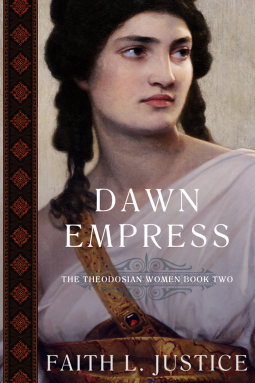
Dawn Empress
The Theodosian Women Book Two
by Faith L. Justice
This title was previously available on NetGalley and is now archived.
Send NetGalley books directly to your Kindle or Kindle app
1
To read on a Kindle or Kindle app, please add kindle@netgalley.com as an approved email address to receive files in your Amazon account. Click here for step-by-step instructions.
2
Also find your Kindle email address within your Amazon account, and enter it here.
Pub Date May 24 2020 | Archive Date Aug 17 2020
Raggedy Moon Books | Independent Book Publishers Association (IBPA), Members' Titles
Talking about this book? Use #DawnEmpress #NetGalley. More hashtag tips!
Description
As Rome reels under barbarian assaults, a young girl must step up…
After the Emperor’s unexpected death, ambitious men eye the Eastern Roman throne occupied by seven-year-old Theodosius II. His older sister Princess Pulcheria faces a stark choice: she must find allies and take control of the Eastern court or doom the imperial children to a life of obscurity—or worse! Beloved by the people and respected by the Church, Pulcheria forges her own path to power. Can her piety and steely will protect her brother from military assassins, heretic bishops, scheming eunuchs and—most insidious of all—a beautiful, intelligent bride? Or will she lose all in the trying?
"Dawn Empress" tells Pulcheria’s little-known and remarkable story. Her accomplishments rival those of Elizabeth I and Catherine the Great as she sets the stage for the dawn of the Byzantine Empire.
A Note From the Publisher
eBook ISBN: 9780917053177
hardcover ISBN: 9780917053238
audio book ISBN: 9780917053252
eBook ISBN: 9780917053177
hardcover ISBN: 9780917053238
audio book ISBN: 9780917053252
Available Editions
| EDITION | Paperback |
| ISBN | 9780917053146 |
| PRICE | $11.99 (USD) |
Links
Average rating from 14 members
Featured Reviews
Dawn Empress by Faith L. Justice
Genre: Historical Fiction and Women's Fiction
Publisher: Raggedy Moon Books
Publish Date: 24 May 2020
The excitement I have experienced at the next book in The Theodosian Women series coming out is unfathomable! I've been highly anticipating this book since reading the first, Twilight Empress which if you haven't read it yet, you should, although they work as stand-alone books and don't have to be read in order. The Theodosian Women series centers around three Augusta's, Placidia, Pulcheria, and Athenais, with each book being dedicated to their life and trials. Since they all lived at the same time with their stories overlapping, you will read about certain situations more than once - but don't be put off. Justice is an expert at focusing on the women caught up in the situation, thus, the situation is never repetitive but rather a new adventure with a new champion. It must be noted that this happened rarely between Placidia of book one and Pulcheria of book two as both women ruled over an administratively split Roman Empire, where they had their own domains...but family and politics are family and politics.
Aelia Pulcheria is the featured Dawn Empress, sister to the Eastern Roman Emperor Theodosius II. She is the Theodosian woman I was least looking forward to but I was very pleasantly surprised and she truly holds her own and so does the book; thus receiving a five-star rating. Being the eldest sibling with her brother in his minority, Pulcheria, grows up too fast in order to protect her orphaned family. She is named Regent for her brother at the tender age of 15, and rigid in her ways to make sure her brother's reign is not sullied with the drunken, adulteress reign of her father. Pulcheria is raised to be an Augusta and lives out a virginal, pietist life devoted to family and people at a time of waning power in the West and a raising in the East, not to mention, having an influential hand in early Christian doctrine that still has a legacy today. There is no denying that Pulcheria was religious, steadfast and a strong ruler - but what was she as a person? Justice, within the book, manages to create a likely humanistic Pulcheria, a person with the world on her shoulders trying to do what she thinks is best and keep her brother alive.
Did I love this fictional Pulcheria? She was very difficult to like at times but that is to be expected. Her accomplishments required a singled minded person who could transcend emotion. But it is her fear that drives her to this, the fear of her mother and father's sins which lead her into a consuming study about the downfall of past rulers so that she and her siblings can avoid their fate. This leads the family, led by Pulcheria, down a very religious path that is highly destructive on occasions not just to the siblings but also to the empire. Pulcheria suffers from pride and vanity when it comes to her position and religious efforts, but she is also an incredible woman with such a big heart that much good was done during her brother's reign, especially for the lowly people. Pulcheria is an incredibly complex character and I've yet to decide what I truly feel about her but I do know that if I had to describe Pulcheria in one word it would be: understanding. She was excellent at understanding people and situations and this is a guiding light in hard times but I also found this frustrating, thus showing I wouldn't make a good ruler.
I particularly loved the interactions of Pulcheria with Placidia and her children. From the first book, Pulcheria, at these times, was a religious zealot and somewhat condescending however getting behind the scenes from Pulcheria's side makes the interactions far more juicier; as well as Pulcheria's interactions and jealousies with Athenais. Unfortunately, I side with Athenais in these. I also loved how the book ended, it was beautifully poetic but simple and the reader is left with the gravity of how important Pulcheria was to the people. The ordinary people who's lives are usually played with by the ruling elite and who are normally the first to feel consequences.
I'm highly, highly looking forward to the next book in the series and hope it's not too far off. Having teasers of the beautiful, romantically tragic Athenais (who couldn't even keep her name) in the first two books has left me with book fever.
Thank you to NetGalley and the publisher, Raggedy Moon Books, for an E-ARC of this book in exchange for an honest review. All opinions are my own.
“You may not be able to pass laws or lead armies,” Princess Pulcheria’s religious tutor tells her as a child, “but the love of the people is no small thing. That power, used wisely… can be just as effective in ruling.”
History abounds with accomplished women whose stories have undeservedly been forgotten. Aelia Pulcheria Augusta is among them, and I hadn’t so much as heard her name until a few weeks ago, when a blog tour invitation appeared in my inbox.
A strong political force in the fifth-century Eastern Roman Empire, Pulcheria guided her younger brother, Theodosius II, during his minority and served as his influential advisor – on and off – through his decades-long reign. With Dawn Empress, second in a series about the Theodosian imperial women, Faith L. Justice gathers up the known facts about Pulcheria and offers a well-rounded, human portrait of this accomplished woman.
The story follows Pulcheria from her youth at the imperial court in Constantinople through the end of her life, with the chapter headings noting the year and place. Pulcheria is intelligent, pious, and frequently stubborn, a combination that doesn't endear her to her brother Theo’s advisors, who want her safely married and out of the picture. Pulcheria has other plans, though. She mingles with the common people, demonstrates charity toward them, and cleverly finds a way to bring honor to the Church and simultaneously remain by her brother’s side. She also persuades her two younger sisters to follow her example.
Pulcheria isn’t always a comfortable heroine. Her judgmental nature and forthrightness are off-putting (just ask her aunt, Galla Placidia), her jealousy of Theo’s wife Athenais gets her into trouble, and she sometimes missteps when it comes to Theo, too. But when it comes to ruling prudently and identifying threats to the realm, her heart is in the right place. With the Huns and other “barbarians” advancing on Rome, and Theo falling under the influence of unsuitable people, Pulcheria can’t let her guard down. The Roman Empire at this time was a hot spot for ecclesiastical heresies, and the author navigates a clear path through these theological disputes without overburdening the reader. Some character names (Anthemius, Asclepiodotus, Olympiodorus, and more) are a mouthful, but the character list helps keep track of who’s who.
It’s a recommended read for historical fiction old-timers who enjoyed the works of Gillian Bradshaw, and for anyone seeking out fresh subjects in historical fiction about world rulers or influential women.
Readers who liked this book also liked:
Marie Bostwick
Historical Fiction, Literary Fiction, Women's Fiction


















